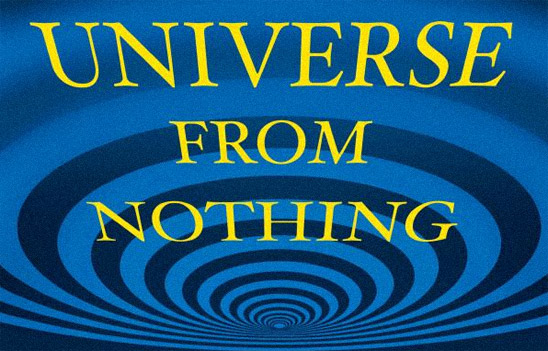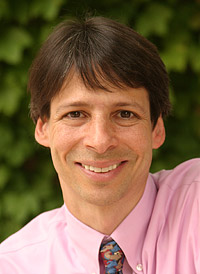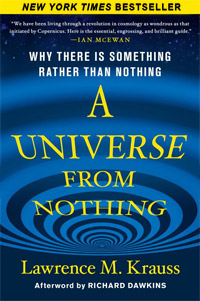In this week’s eSkeptic:
The Latest Episode of Mr. Deity: Mr. Deity and the Rights
WATCH THIS EPISODE | DONATE | NEWSLETTER | FACEBOOK | MrDeity.com
About this week’s eSkeptic
In this week’s eSkeptic, Andrew Zak Williams reviews Lawrence Krauss’ latest book A Universe from Nothing: Why There Is Something Rather than Nothing, with an Afterword by Richard Dawkins (Free Press, 2012, ISBN-13: 978-1451624458). This review appears in the Skeptic magazine 17.2 (2012).
Andrew Zak Williams is a barrister based in England. He has written for The Independent newspaper, The New Statesman, The Humanist and American Atheist. He is also a columnist at www.secularnewsdaily.com.

A Universe From Nothing?
by Andrew Zak Williams
In hindsight I couldn’t have chosen a worse time to interview the renowned cosmologist Lawrence Krauss. With his newly released book A Universe From Nothing adorning the New York Times bestseller list, the man of the moment had become the man with no moment to spare. Our first attempt by Skype was postponed due to a photoshoot that ran late. More troubling, the next delay was caused by a break-in at his office in Arizona State University where he is Foundation Professor and Director of the Origins Project. Our next attempt to speak conflicted with a live internet stream his publishers had organized for him with Richard Dawkins.
When we finally met, Krauss was remarkably relaxed and convivial, dressed in the brown suede jacket which, from what I can tell, has accompanied him on most of his public appearances for some time. Within moments, what struck me was the wide-eyed awe he retains for his subject. In fact, it was surely his infectious enthusiasm that turned his lecture on the origins of the universe at the 2009 Atheist Alliance International conference into an Internet sensation, attracting over a million YouTube hits, the success of which gave him the idea to write his latest book.
Since the book sets out to provide a plausible account for the origin of the universe—in particular one that doesn’t involve the supernatural—he could hardly have been surprised that not everyone welcomed his contribution to the subject. The extent of the flak he has received from some parts of the religious community was a recurring theme of our conversation.
“I’m not bashing religion,” he explained. “In fact, physicists spend so little time thinking about God they don’t bother worrying whether they are atheists. God is simply an irrelevance to physics.” Even so, as someone who recently debated the evidence for the existence of God with leading religious apologist William Lane Craig, he knows that his book could sound the death knell for one of the key arguments on which theists rely. (More below.) As for the likes of Craig, Krauss says they are “hucksters running cheap arguments and pedaling a philosophy that has been overtaken by science. They may not like the way the universe works, but who cares? The universe is the way it is.”
This exemplifies the straight-talking approach adopted in the book even though Krauss also frequently reaches inside a trunk-load of humorous analogies he’s heaved around the lecture circuit. Take antimatter: Krauss writes, “It is strange in the sense that Belgians are strange. They are not really strange; it is just that one rarely meets them.” And after explaining that the question why there is something rather than nothing has no basis in science, he drives home the point by announcing that the question “may be no more significant or profound than asking why some flowers are red and some are blue.”
So perhaps it should come as no surprise that the most quoted individual in the book isn’t one of the many theoretical physicists about whose works Krauss is thoroughly knowledgeable. Instead it’s the late Christopher Hitchens, the titan of the New Atheism who was to write a foreword to the work until his illness took him from us.
I asked Krauss about the loss to the skeptical cause following Hitchens’ passing: “He was cultured in a way that none of the rest of us are,” he replied. “So he connected with many people who may not otherwise have been interested in what the likes of, say, Richard Dawkins or I would have to say. Christopher was a wonderful human being. Simply irreplaceable.”
Krauss could see where I was going with this line of questioning and quickly noted, “I have received some emails from people suggesting that I could fill part of the gap left by him,” he added. “If I can fill the void in some small way, I’d be very pleased to do so. In fact, as a scientist I may even be able to reach some audiences that were beyond Christopher.”
This is where A Universe From Nothing comes in. In fewer than 200 pages it sets out to rebut the age-old argument raised by religious apologists who contend that the reason why there is something rather than nothing is that God, outside of time and space, created both at the moment of the Big Bang.
“I think it is virtually certain that everything we see came from empty space,” Krauss exposited. “And all the physics I know is highly suggestive that our universe popped into existence as a quantum fluctuation.” The book develops this by explaining that because of the laws of quantum mechanics and special relativity, empty space consisted of a bubbling brew of virtual particles spontaneously popping in and out of existence on timescales too small to notice. (It is this behavior that makes them virtual.) This was the “nothing” out of which the universe arose. These bubbling activities, known as quantum fluctuations, caused a mass density fluctuation which, in combination with the process of cosmological Inflation, resulted in the Big Bang.
But what about the religious apologists who say that there must have originally been a purer form of nothing, one that didn’t consist of virtual particles? Krauss was dismissive. “I’m not interested in classical, logical descriptions of nothing, but rather what science tells us about nothing. The philosophical bother may be there, but who cares? It just means the universe is cleverer than theologians are. The fact that you can’t get your head around it doesn’t make it less so.”
Still, Krauss’s book deals with how the universe could still have come into existence even if what preceded it was this purer form of nothing, one that doesn’t allow even for empty space. As he explained it to me, “If, at the very beginning, quantum mechanics was applied to gravity, space and time would have become dynamical and so would have spontaneously appeared. So you wouldn’t have needed pre-existing space. Instead the space itself would have arisen.” Why is that? Krauss’s answer: “Because nothing is unstable.” What does this mean? Krauss continued:
When you take out gravity, nothing will always be unstable with particles popping in and out of existence, but these are only virtual particles. But once you have gravity, you offer the possibility of creating something real—that is, not just virtual particles— with zero total energy. Nothing is unstable because once you’ve made something real with zero energy, quantum mechanics says you’ll always create it. If you wait long enough, no matter how small the probability is, it must arise. If you have particle pairs with a gravitational attraction that is just right for their total energy to be zero, you’re guaranteed that something will arise from nothing. That’s because nothing with total zero energy is unstable and so will create something with total zero energy.
In short, although there isn’t yet a fully worked out model of quantum gravity, Krauss’ point is that if you apply quantum mechanics to gravity, not only can a universe spontaneously appear from nothing, it must do so. After explaining this, he returned to a recurring theme: “Some of this bothers people. But who cares? Quantum mechanics is illogical—just get over it.”
I should pause at this point to mention that when religious apologists posit God to explain how something came from nothing, a skeptical retort sometimes heard is that the universe may be eternal: Our own baby universe originated at the Big Bang but the cosmos that gave birth to it may be eternal. And so there never was a nothing from which something arose. There are numerous models that allow for this, most notably the inflationary multiverse, quantum tunneling, and two ideas based on string theory, namely the Ekpyrotic (“conflagration”) scenario and the pre-Big Bang scenario. Yet these models are barely testable, let alone proven. Krauss’ book is particularly useful in showing that skeptics don’t need to resort to these scenarios in order to deal with theist cosmological arguments.
Where did the very laws of nature that Krauss describes come from? After all, some theists may agree with everything Krauss says but then posit God as the creator of the scientific laws that made it all possible. The book answers this question by referring to the possibility of an inflationary multiverse in which the natural laws of any particular baby universe are created spontaneously at the point of its creation. When I asked Krauss whether that means that he considers that the universe must be eternal after all, he swatted away the question by pointing to how much we still have to learn. He added, “Whether the laws themselves are fluid or whether there’s only one set of laws is something I’m agnostic about. I like the idea that there’s only one set of laws but what I like is irrelevant.”
Towards the end of our conversation I reminded Krauss about the afterword to his book in which Richard Dawkins writes that if On the Origin of Species was biology’s deadliest blow to supernaturalism, we may come to see A Universe from Nothing as the equivalent from cosmology. I asked whether he worries about trying to live up to the implied comparison with Darwin, one of the greatest scientists ever. Yet before he even responded, I knew the answer. Krauss is enjoying himself far too much for that. ![]()
Our Next Lecture at Caltech:
Dr. Art Benjamin

The Secrets of Mental Math: The Mathemagician’s Guide to Lightning Calculation and Amazing Math Tricks
SUNDAY, JUNE 10, 2012 AT 2 PM
Baxter Lecture Hall
Teachers and parents, bring your students and kids to see the famous lightning calculator and mathemagician Art Benjamin demonstrate simple math secrets and tricks that will forever change how you look at the world of numbers. Get ready to amaze your friends—and yourself—with incredible calculations you never thought you could master, and learn how to do math in your head faster than you ever thought possible, dramatically improve your memory for numbers, and—maybe for the first time—make mathematics fun. Dr. Benjamin will teach you how to quickly multiply and divide triple digits, compute with fractions, and determine squares, cubes, and roots without blinking an eye. No matter what your age or current math ability, Dr. Benjamin will teach you how to perform fantastic feats of the mind effortlessly. This is the math they never taught you in school.
Admission policy for Baxter Lecture Hall
Due to security concerns, Baxter Hall will be locked and the audience will be admitted only through the doors on the South side of the building by the lily ponds. If, for medical reasons, you cannot climb the stairs to the hall on the 2nd floor, someone at the main entrance (located in the middle of the West side of the building) will escort you to the elevator.
Tickets
First come, first served at the door. Seating is limited. $8 for Skeptics Society members and the JPL/Caltech community, $10 for nonmembers. Your admission fee is a donation that pays for our lecture expenses.
Announcing The Amaz!ng Meeting 2012
Southpoint Hotel & Casino, Las Vegas, NV
July 12–15, 2012
THE AMAZ!NG MEETING (TAM) is an annual celebration of science, skepticism and critical thinking. People from all over the world come to TAM each year to share learning, laughs and the skeptical perspective with their fellow skeptics and a host of distinguished guest speakers and panelists.
The James Randi Educational Foundation (JREF) has hosted its annual Amaz!ng Meeting since 2003 as a way to promote science, skepticism and critical thinking about paranormal and supernatural claims to the broader public. TAM has been held in Las Vegas, NV since 2004 and has become the world’s largest gathering of like-minded science-advocates and skeptics.
With yet another incredible lineup of speakers, hands-on workshops, and entertainment, this is sure to be an Amaz!ng Meeting you won’t want to miss! Check out the entire program, and follow @jref on Twitter for the latest #TAM2012 news and announcements.












